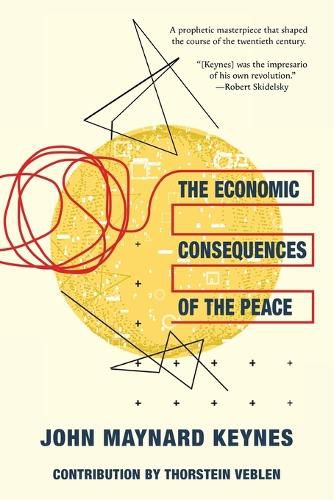Readings Newsletter
Become a Readings Member to make your shopping experience even easier.
Sign in or sign up for free!
You’re not far away from qualifying for FREE standard shipping within Australia
You’ve qualified for FREE standard shipping within Australia
The cart is loading…






This title is printed to order. This book may have been self-published. If so, we cannot guarantee the quality of the content. In the main most books will have gone through the editing process however some may not. We therefore suggest that you be aware of this before ordering this book. If in doubt check either the author or publisher’s details as we are unable to accept any returns unless they are faulty. Please contact us if you have any questions.
A prophetic masterpiece that shaped the course of the twentieth century.
First published in 1919, The Economic Consequences of the Peace is John Maynard Keynes's searing indictment of the Treaty of Versailles. Drawing on his unique vantage point as a delegate to the Paris Peace Conference, Keynes exposes the flawed logic and vengeful spirit that drove the Allies to demand impossible reparations from a shattered Germany. With clarity and precision, he warns that these punitive measures would not only cripple Germany's recovery, but also imperil the economic stability of all Europe and, ultimately, the world.
Keynes's analysis proved uncannily accurate. The economic chaos and resentment he predicted fueled the rise of extremism and paved the way for another devastating conflict. His book quickly became an international sensation, shaping public opinion and influencing policymakers on both sides of the Atlantic. It remains a touchstone for anyone seeking to understand the intersection of economics, politics, and peace.
In an era marked by global crises, fractured alliances, and the resurgence of nationalism, Keynes's insights are more relevant than ever. He understood that economic policy and international cooperation are inseparable-and that the seeds of future conflict are often sown in the failures of peace.
This meticulously produced new edition invites readers to rediscover Keynes's urgent call for empathy, foresight, and economic wisdom. With its enduring lessons and vivid prose, it stands as a warning-and a guide-for all who care about the fragile architecture of peace. Includes a critical review of The Economic Consequences of the Peace by fellow economist Thorstein Veblen and biographical essays on both authors.
$9.00 standard shipping within Australia
FREE standard shipping within Australia for orders over $100.00
Express & International shipping calculated at checkout
Stock availability can be subject to change without notice. We recommend calling the shop or contacting our online team to check availability of low stock items. Please see our Shopping Online page for more details.
This title is printed to order. This book may have been self-published. If so, we cannot guarantee the quality of the content. In the main most books will have gone through the editing process however some may not. We therefore suggest that you be aware of this before ordering this book. If in doubt check either the author or publisher’s details as we are unable to accept any returns unless they are faulty. Please contact us if you have any questions.
A prophetic masterpiece that shaped the course of the twentieth century.
First published in 1919, The Economic Consequences of the Peace is John Maynard Keynes's searing indictment of the Treaty of Versailles. Drawing on his unique vantage point as a delegate to the Paris Peace Conference, Keynes exposes the flawed logic and vengeful spirit that drove the Allies to demand impossible reparations from a shattered Germany. With clarity and precision, he warns that these punitive measures would not only cripple Germany's recovery, but also imperil the economic stability of all Europe and, ultimately, the world.
Keynes's analysis proved uncannily accurate. The economic chaos and resentment he predicted fueled the rise of extremism and paved the way for another devastating conflict. His book quickly became an international sensation, shaping public opinion and influencing policymakers on both sides of the Atlantic. It remains a touchstone for anyone seeking to understand the intersection of economics, politics, and peace.
In an era marked by global crises, fractured alliances, and the resurgence of nationalism, Keynes's insights are more relevant than ever. He understood that economic policy and international cooperation are inseparable-and that the seeds of future conflict are often sown in the failures of peace.
This meticulously produced new edition invites readers to rediscover Keynes's urgent call for empathy, foresight, and economic wisdom. With its enduring lessons and vivid prose, it stands as a warning-and a guide-for all who care about the fragile architecture of peace. Includes a critical review of The Economic Consequences of the Peace by fellow economist Thorstein Veblen and biographical essays on both authors.